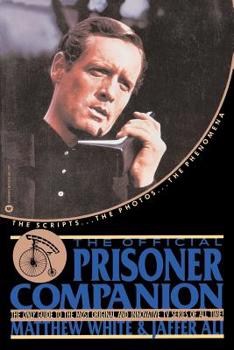Official Prisoner Companion
Select Format
Select Condition 
Book Overview
It is called, with deceptive simplicity, The Village. It is the world of tomorrow, or today. A man known only as Number 6 enters its storybook-like confines. He will learn, over and over again, that inside it there is no freedom, and from it there is no escape. He is without defenses, except for one invisible weapon: his uncrushable spirit.
Format:Paperback
Language:English
ISBN:0446387444
ISBN13:9780446387446
Release Date:July 1988
Publisher:Grand Central Publishing
Length:256 Pages
Weight:0.82 lbs.
Dimensions:0.8" x 6.0" x 8.9"
Customer Reviews
2 ratings
Historical Inaccuracies
Published by Thriftbooks.com User , 21 years ago
In this book, it is stated: "On a different note, in their "Observations" regarding the episode 'A Change of Mind', the authors suggest that "it is easy to make comparisons between the committee in this episode and McCarthy's House Un-American Activities Committee of the 1950s."If the authors knew a little more about the period when The Prisoner was filmed they might have made the rather more relevant observation that the various events in this episode very closely resemble the excesses of the Chinese Cultural Revolution - of the 1960s."Even worse than missing the importance of the Chinese Cultural Revolution, the authors show even less knowledge of US history. McCarthy was NOT a member of the House Un-American Activities Committee. He was a Republican Senator from Wisconsin, thus, not even a member of the House. HUAC's primary interest in those days seemed to be in rooting out left-wingers from Hollywood. McCarthy made his fame from claims, never established, of as many as 205 Communists or sympathizers (whatever that might mean) in the Army and the State Department. McCarthy never undertook investigations of former spies nor did his tactics, based more on implications of guilt by association or skillfully worded queries of the "do you still beat your wife?" type, that trapped witnesses into unintended and incorrect answers, ever kidnap or imprison those suspected of wrongdoing. In the days of the Red Scare, simply implying a person was "soft" on Communism could ruin a career. The information on McCarthy and HUAC is readily available. Errors of this sort mean sloppy research by the authors. What, then, of their critique can we trust?
An excellent book for an excellent TV show
Published by Thriftbooks.com User , 24 years ago
Matthew White and Jaffer Ali have done a fantastic job in the preparation of this book about the television program, "The Prisoner".The book is divided into seven major parts (five chapters and two appendices). The first is a guide to all 17 episodes, with 5 to 8 pages per show. The guide gives cast and crew credits for each episode, a very thorough synopsis of the episode, and the authors' observations and comments about production details, script changes, deleted scenes, etc.The second part is entitled "Notes, Anecdotes, and Nonsense" and it provides trivia and more production notes. It is shallow, and you can find more detailed explanations about the facts and issues elsewhere, but since one could make a several hundred page book out of this material alone, the authors can hardly be faulted for being selective in their presentation.The third part is absolutely invaluable for new-comers to "The Prisoner". Entitled "The Great Debates", this section summarizes the major points of contention among the show's fans. Among them are: Was the Prisoner really John Drake from "Danger Man"? Who runs the Village? What is the proper order to watch the episodes in? If you are new to the series, be sure to read this section before you start posting to discussion groups, it will save you the embarassment of repeating some well-known points.The fourth part, "What Does it All Mean?", discusses symbolism in the show, the philosophical implications of it, etc. This is also a section which could be deeper, but it is another good introduction.Next is a brief biography/filmography of Patick McGoohan (the Prisoner/No. 6 himself). The highlight of this section is a 1985 interview McGoohan gave to New Video Magazine, which he claimed would be the last interview he would do about "The Prisoner". (McGoohan has actually discussed the show several times since then, but the interview is fascinating nonetheless.)Sixth is a section on further sources of information about "The Prisoner". Unfortunately, it is rather out of date, since the last few years have seen a resurgence of interest in the series. However, it still has such useful facts as the address for The Prisoner Shop in Portmeirion or how you can contact the major fan clubs devoted to the series.Finally, part seven has excerpts of shooting scripts from several episodes, including much of "Arrival", the Prisoner's campaign speech from "Free For All", and the ultimate battle of wits between the Prisoner and No. 2 in "Once Upon A Time".My only major regret about this book is that I got it before I had seen the entire series. The synopses do give away secrets and twists from the episodes, so I would recommend that you see all 17 shows before you read this book to get the full impact of the series.A final note: New information has come to light which resolves a contradiction the book mentions. There had been speculation for years about the original nature of "Rover" (the security dev






